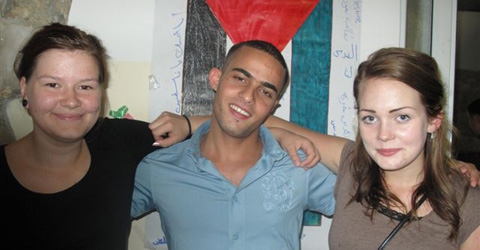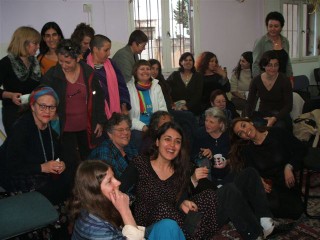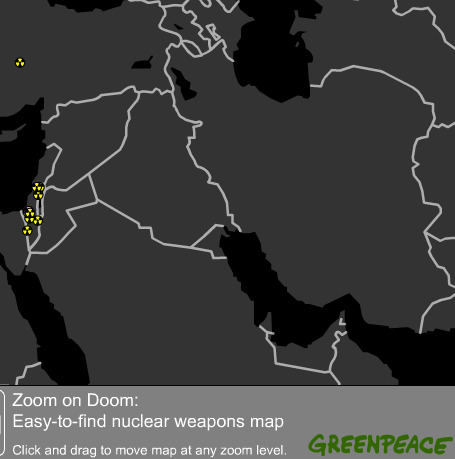Adeeb Abu Rahma at Bil’in Demonstration
Adeeb Abu Rahma, a taxi driver from the West Bank Village of Bil’in, is known for his firm committment to nonviolence during the weekly demonstrations against the Wall. At the July 10, 2009 demonstration, he was grabbed by Israeli soldiers as he walked away from them, his message of resistance on a sign he held. He has been imprisoned ever since, without trial. Adeeb is the sole provider for his nine children, wife and mother.
Bil’in Village reports on an interview with Adeeb’s wife, Fatma Abu Rahma:
Fatma Abu Rahma and five of her nine children have gathered in the living room of the family’s prospective son in law. The house is fully equipped, but its sterile immaculateness divulges its lack of inhabitants. Doha, who is nineteen, will move in once she is married, but has been postponing her marriage until the release of her father Adeeb. Fatma’s tiredness, frustration and despair read from her eyes and are confirmed in her muttering speech, calling on Allah to help her family. She repeatedly exclaims that she lacks information on her husband’s current state of being, which cause her grave irritation and concern.
My husband has been away from me and my family for almost nine months. On July 10th 2009 Adeeb attended the weekly demonstration in Bil’in, on this day soldiers grabbed and arrested him. He was officially charged with incitement to violence. The truth is that he is arrested for nothing more than taking part in a popular demonstration against land theft committed by Israel. Adeeb encouraged others to join the protests, while Israel clearly wants to annihilate the popular resistance. He is imprisoned for defending his people’s rights.
I am grief-stricken since Adeeb’s imprisonment. However, I cannot allow myself to lament my husband’s loss as I have a family of nine to take care of. Since Adeeb has been away, I have to be both mother and father to my children. We shared the care over the children, this is now my sole responsibility. We miss him very much.
Batuh, the youngest daughter, has caught on the topic of the conversation, stops playing, and stresses the tension by softly, but firmly addressing her mother: “I want to go with you, to see ‘baba’!”
We have only been allowed one visit since Adeeb’s arrest. Batuh was there to see her father, but she was afraid of the pale and sad figure that her lively father had turned into. She did not even recognize Adeeb and refused to talk to him. Since this visit, no one from the family has been allowed to visit. We are all considered to be “security threats”. Generally, prisoners are entitled to two visits every month. We are not allowed to send him a letter or call him. Even his lawyer has only been allowed one visit. The little information we have on Adeeb, we gather through prisoners who have been released. Apparently, my husband was hospitalized for four days recently, but nobody told us!
The living conditions in Ofer prison are said to be extremely harsh. During his first days of detention, Adeeb was beaten severely by his guards. He had been drenched by the stinking chemical water that the army used during the demonstration. The prison administration would not provide fresh clothing, so fellow prisoners gave him another outfit. Four months after his arrest, I took three of our daughters to visit Adeeb in prison and bring clean clothing. We were not allowed to give him his trousers, supposedly because he had not demanded them on the prison’s official request form! Clearly, that is a lie
Alaah, 17 years old, was particularly moved by the visit: “My father looked very sad and tired. I felt such desperation this day. We were so close, but kept apart by a glass barrier in the prison’s visiting area. I wanted to sit next to him and touch him.”
Together with ten other prisoners, my husband spends day and night in a prison cell of less than 15 square metres, which includes the bathroom. Sunlight is limited in this cramped cell. A tiny bathroom window and small openings in the ceiling are the only sources of daylight. Adeeb can only escape this cage and grasp a sense of the real world during a daily ten-minute walk outside.
Financially, it has been really difficult on us. Adeeb used to work as a taxi driver, so our family suffers from this loss of income. We still have a little shop, opened by two of my children, but it does not cover my family’s necessary expenses. Our two eldest daughters are in university, which is very expensive.
It has been even harder on an emotional level. Two months ago, Alaah, my daughter of 17, was very sick and was even hopsitalized twice. She could not walk or move, as if she was paralyzed. The doctors could not find anything wrong with her and decided it was psychosomatic…
Adeeb has had 15 court hearings so far. His case has been remanded until the end of legal proceedings, which may take up to a year or longer. Basically, we do not know when he will be back home
Postscript: the family was allowed one visit on March 17, shortly after this interview.
Video of Bil’in July 10th 2009 demonstration shows Adeeb being hauled away by Israeli soldiers; he has been imprisoned without trial ever since
Swedish Palestinians Barred Entry for Promoting Coexistence
 Members of the Olof Palme Centre’s Old City Youth AssociationA Jewish-Palestinian joint dialogue group arrived from Sweden’s Olof Palme Centre for a visit to Israel. You might think they would have no problems gaining entrance into Israel. You would be wrong. Here’s the Ha’aretz editorial on the subject.
Last week Israel deported three Swedish women from Ben-Gurion International Airport who had arrived in a group of seven young people of Jewish and Palestinian heritage, active members of a Jewish-Palestinian education group in Sweden. The three women – all Swedish citizens of Palestinian background, two of whom were born in Sweden – were loaded onto a plane home after being held at the airport for eight hours of intermittent questioning.
It went a bit easier for one of the Jewish members of the group, who was allowed in on the condition he not actually try to visit any Palestinians with his message of coexistence and pay a ransom.
Amira Hass reported in Haaretz Hebrew Edition on Friday that a Jewish member in the group, Tigran Feiler – whose father is the Israeli-Swedish artist Dror Feiler and whose grandmother was among the founders of Kibbutz Yad Hanna – was also delayed in his arrival. In addition, he was asked to sign a statement that he would not enter Palestinian territory and was ordered to provide NIS 5,000 in collateral. Feiler ultimately signed under protest, stating that in his 25 previous visits to Israel he had never received such hostile treatment.
The editorial goes on to imagine if it had been the other way around.
One can only imagine the scandal that would erupt in Israel if Sweden had prevented West Bank settlers or rightist activists from entering its territory.
Hopefully, the Israeli government’s increasing fear of anyone promoting coexistence will become a scandal all by itself.

By Rela Mazali
 Members of Isha L’ Isha (Woman to Woman)
In an extensive, research-based 2009 position paper titled: On Nuclear Weapons: A Feminist Perspective, Edna Gorney and Hedva Eyal of the Isha L’Isha Haifa Feminist Center wrote, “the Israeli public remains excluded from the [nuclear] debate. The public does not ask questions, does not demand that the state takes responsibility, nor does it demand to be involved in decision making; it accepts and is content with the information or, more accurately, with the lack of information.”
This passive indifference to the nuclear weaponry widely believed to be in the public’s backyard is, in my view, a highly dangerous manifestation of Israel’s longtime and entrenched militarization. As Gorney and Eyal have put it, “Decision-making in all areas related to security is characterized by secrecy and vagueness, excluding anyone who does not belong to the security elite. … The secret functions both on the outside as well as on the inside. Denying information under the guise of maintaining secrecy is one of the common ways through which elites maintain their status. … [While o]ne of the ways they can attain legitimacy for their control and actions is to continuously disseminate and instill fear – real and imaginary – among the citizens of Israel. This fear justifies and, in turn, foments military power and its use against any security threat, as defined by this elite group.”
Meanwhile, Gorney and Eyal have noted, “We are flooded with information on the great threat Iran poses and on the necessity of military operations. The debate within the Israeli public discourse is almost devoid of the possibility of solution through diplomatic means.”
Outlining the severely undemocratic suppression of any public nuclear debate in Israel, the position paper lists a line of researchers, journalists, politicians, activists and ex-security personnel who’s critical voices have been stifled by the security establishment, using a broad range of tactics. This in addition to the constant dissemination of fear underpinning militarization in general and the unquestioning Israeli public acceptance of its governments’ nuclear armament in particular. Thus, the risks of such armament to this public itself, as well as the entire area or even the globe, go unexamined and undebated for decades on end.
Resisting this reality and reaching for an actual, participatory democracy, Gorney and Eyal explain, “As feminists we wish to expose the connections between the policy of opacity, concealment and fear, and the current perception of security. We want to take responsibility for our lives and for actions carried out in our name.”
In one of the rare public voices taking up these issues, the position paper concludes:
“We demand the removal of opacity surrounding the issue of nuclear weapons in Israel; We demand a public debate and the development of an alternative policy that will enable us to live in peace in the Middle East; We demand nuclear disarmament; We demand that the State of Israel join the International Treaty on the Non-Proliferation of Nuclear Weapons.”

Click here to download the full 22 page position paper.
Another such public voice, sounded now for many years, is that of nuclear historian and analyst, Avner Cohen, whose work is one of main sources repeatedly referred to by the Isha L’Isha position paper. Cohen is equally critical of successive Israeli governments’ successful barring of nuclear debate and, in a recent op-ed, offers a series of serious arguments against what he views as the irresponsible and extremely dangerous possibility that Israel might launch a military attack against Iran in an attempt to quash its nuclear capacity.
Cohen’s op-ed, converging in part with some of the conclusions presented by the Isha L’Isha position paper, was published April 2nd in Haaretz and claims, among other things, that:
Instead of a public discussion [of a possible Israeli attack against Iran] there has been a belligerent press, which makes demagogic use of statements that intensify the message of the politics of fear. These include expressions such as ‘Iran is galloping toward a bomb’ and a ’second Holocaust’ that Israel must prevent. Such discourse creates a feeling that if Iran is not attacked, and soon, we have no choice but to accept a nuclear Iran. [Meanwhile,] It’s doubtful whether the people making those statements are capable of giving them a precise (technical and political) interpretation.
[Israel’s is] a culture of national security in which nuclear opacity has been exploited to the hilt to create a specific model of deterrence. The result is that when [… we Israelis] look at Iran we see ourselves: how we would behave in a similar situation. [… This] leads to systematic errors when making assessments.”
More Recent Articles
|
 Members of the Olof Palme Centre’s Old City Youth AssociationA Jewish-Palestinian joint dialogue group arrived from Sweden’s Olof Palme Centre for a visit to Israel. You might think they would have no problems gaining entrance into Israel. You would be wrong. Here’s the Ha’aretz editorial on the subject.
Members of the Olof Palme Centre’s Old City Youth AssociationA Jewish-Palestinian joint dialogue group arrived from Sweden’s Olof Palme Centre for a visit to Israel. You might think they would have no problems gaining entrance into Israel. You would be wrong. Here’s the Ha’aretz editorial on the subject.




